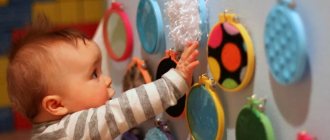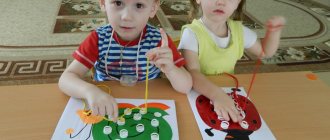Features of moral development of young children
At an early age, children begin the process of moral personal development, which
- cognitive (information) aspect – knowledge and ideas about moral concepts, standards, norms, rules, personal moral qualities;
- emotional and motivational aspect - moral feelings, social and moral emotions, moral motives and preferences, moral assessment and self-esteem;
- behavioral aspect - moral actions and deeds, moral habits, i.e. implementation of moral norms and requirements.
The interrelation of cognitive, affective and behavioral components in the personal sphere determines the unity of moral consciousness and behavior . These components only begin to form at an early age. This is facilitated by children’s desire to collaborate with adults and their high imitation.
In early childhood, the child begins to understand certain moral rules of behavior . Such an understanding is limited to a specific situation, the framework of the child’s visual and effective thinking. Understanding the rules and norms of behavior is based on the child’s own experience, when he realizes the negative consequences of breaking the rules and the positive consequences of following them. In this regard, from an early age, an adult must justify the demands put forward, based on specific life situations and the child’s own experience. In children's active vocabulary there are few words denoting moral categories; evaluation and ethical concepts are used: good - bad, good - evil, etc. The concepts “bad” and “good” initially express the attitude of an adult, and the child only remembers and repeats them in similar situations . The content of motivational orientation from the standpoint of moral education is still poorly developed.
The development of the emotional component of a child’s morality is associated with the formation of intelligence, his mental activity, and a system of knowledge about encouraged and condemned patterns of behavior. Through this, the child gradually has the opportunity to evaluate his behavior and prepare to perceive the upcoming assessment of his activities by adults. A child’s moral emotions are manifested and strengthened in the process of observing specific actions and deeds of a person. For the moral development of a child, an organic connection between knowledge (moral concepts) and moral assessments of behavior (good - bad) is necessary. The formation of only knowledge about the moral qualities of people cannot ensure the emergence of corresponding moral feelings and emotions in a child; they appear in him as an expression of his own attitude to a certain human act, based on existing needs, a set of knowledge and experiences. The role of an adult in the moral development of children is that he teaches the child to evaluate actions and evokes in him an appropriate emotional attitude towards what is currently happening in a particular situation. Fixed in the child’s mind, such assessments begin to express his positive or negative attitude towards himself and the actions of others.
The increasing complexity of a child’s activities and his increasing independence lead to the need to introduce more complex moral rules of behavior. By obeying these rules, the child learns to regulate his actions. Compliance with moral norms and rules is not of independent importance for children, but is a means of maintaining positive contacts with adults and receiving a positive assessment from adults. The need for a positive assessment from an adult encourages the child to act in accordance with the rules.
Early age corresponds The stages corresponding to the premoral level are:
- obedience of a child to avoid punishment;
- the conditioning of actions by selfish considerations of mutual benefit (obedience in exchange for receiving some specific benefits and rewards);
- the conditioning of actions by the desire for approval from “significant others” and shame before their condemnation.
This does not mean that the child, under the influence of these motivating factors, systematically controls his behavior. It is very difficult for young children to resist immediately gratifying a momentary desire and even more difficult to perform an unattractive action at the suggestion of an adult. When performing uninteresting tasks for an adult, children either change them or get distracted and do not complete the task.
The formation of moral habits and actions is formed gradually; if an adult consciously puts forward systematic, consistent and motivated requirements, checks their implementation, then the implementation of such rules becomes habitual for the child. The child quickly reacts to the usual rules. Gradually, discipline, organization, and the need to follow the rules are formed, which contributes to the assimilation of more complex rules of behavior and the formation of moral qualities of the individual. The formation of moral habits in early childhood occurs in everyday activities, when an adult shows a model of behavior and requires the child to follow this model, first in joint activities with him, and then in independent activities.
Case Study
Maxim M., 2 years 8 months. His mother tries to ensure that her son sees manifestations of compassion and care among family members towards each other. “Don’t make noise, dad is tired, he’s sleeping. Don’t wake up dad,” mom says in a whisper. Maxim, imitating her, begins to behave quietly and, if one of the adults accidentally forgets, he himself will remind: “Nezya, daddy is drinking.”
In general, a young child is characterized by spontaneous morality. The child performs positive actions at the request of an adult and most often does not identify them as such. Without control and evaluation from an adult, the child acts situationally and impulsively, and therefore often breaks the rules. The moral behavior of young children is closely related to a positive emotional attitude towards the object at which it is directed. A child is more likely to do a good deed towards an adult or child whom he treats well. A positive emotional state, sympathy and goodwill towards other people and animals are the basis for moral manifestations.
Thus, the moral development of a young child occurs on the basis of presenting a system of demands to adults and teaching them to fulfill them. This is facilitated by children’s desire to establish and maintain positive contacts with adults. Based on imitation of adults’ assessments, the first value judgments are formed, which are then transformed into the child’s own attitude towards himself and other people. However, situational and impulsive behavior often leads to violation of requirements and prohibitions. The moral manifestations of a child depend on the emotional attitude towards an object and arise spontaneously, unconsciously, when prompted by an adult or in a specific situation.
When to start developing the moral qualities of a person
There is an opinion that a person’s character is formed before the age of 5 - the rest of the time it can only be adjusted. Yes, the foundation of personality is laid in early childhood, but under the influence of the immediate environment, a person’s moral qualities can undergo changes throughout his life. Another statement: how well a child is raised depends on his future fate, the opportunity to find his place in life, and the ability to become happy.
By the age of 5, a child, as a rule, is already able to evaluate his actions, separate good behavior from bad, and control his emotions.
A child will not be able to develop the necessary moral qualities and behavioral skills without the direct participation of significant adults in this process. That is, the child must be taught all this, just like counting or tying shoelaces. The closest people to preschool children, as a rule, are parents and teachers.
Spiritual and moral education of preschool children - Teplova A.B. / Educators of Russia
Tasks of moral education of preschool children
The spiritual and moral education of preschool children is based on several important “pillars”:
- a life principle built on goodness, the absence of sinfulness and evil;
- humane attitude towards friends and strangers;
- development of cultural skills;
- growth and harmonious development of the child as an individual.
Each of the principles involves specific work with the baby. So, in the first case, good fairy tales or Orthodox parables that children can understand, in which good certainly triumphs over evil, will help convey the necessary information.
Unobtrusive conversations, stories and examples from life will teach you to treat others humanely.
You can cultivate a craving for cultural values by first visiting nature museums with your child, and then galleries and exhibitions. If you don’t have the necessary knowledge yourself, you can take a guide who, taking into account your age, will tell you about the exhibits in an interesting and fascinating way.
Moral education of children using Russian folk tales and Soviet animation
How to cultivate spiritual and moral qualities, examples and recommendations
Personal example
It is known that the best method of education is personal example. Any words lose their meaning if they are not used in practice. No matter how much parents and educators talk about good behavior, respect for others and a humane attitude towards nature, if adults do not do what they talk about, then all the talk will be in vain.
For example, if dad declares that one must love animals, but he kicks away a stray kitten, then this is unlikely to be a worthy example to follow. If a mother communicates with her neighbor in the most kind way, but gives unflattering assessments behind her back, then her daughter is more likely to learn a lesson in hypocrisy and double-mindedness than a sincere attitude towards loved ones.
Moral education of preschoolers is not an easy task, and in order for your child to grow up to be a worthy person, he must copy your appropriate behavior.
Ability to share
It is extremely difficult for small children to understand why he should give, even temporarily, his favorite toy to a boy in the sandbox. The child still has no idea what generosity is, what greed is, and you shouldn’t reprimand him for it. You need to simply and unobtrusively tell how great it is when you can please another person - then you yourself will be happier, how great it is when you love not only receiving gifts, but also giving them.
A little later, the topic of “know how to share” can be expanded. Children learn that they can share not only objects, toys, and treats, but also a warm attitude, a good mood, and a smile. It is appropriate to recall the wonderful song about a smile from the cartoon.
Caring for others
It is also easier and more effective to cultivate such moral qualities as kindness and responsiveness through personal example. When children see that mom and dad love not only them, but also a disabled neighbor on the playground, that they are not capable of offending not only a person, but any living creature either by word or action, you can be sure that the kids will absorb into themselves this behavior.
At an early age, the spiritual and moral education of children through fairy tales is of invaluable importance. In particular, K.D.’s fairy tales vividly teach us to take care of others. Ushinsky “Know how to wait”, Russian folk song about a cockerel, a chicken and a bean seed, etc.
We learn the main ethical standards of a kindergartener
When already preparing your child for his first visit to kindergarten, you can teach a small but clear lesson on the topic “moral education of preschool children.”
It is possible that the child will have to face the fact that other guys are fighting.
- We need to explain to him that it is absolutely forbidden to offend other people, and especially beat them.
This first “no” leads to the second, which indirectly continues the first:
- You cannot spoil, tear, or break books or toys. They were made by people. Human labor was spent on them. By spoiling a thing, you will offend a person and disrespect his work.
- The little man must remember the third “no” for the rest of his life: taking someone else’s property without permission is theft.
These three “don’ts” ultimately turn into an undeniable truth: you cannot grow up to be a good person if you violate them.







